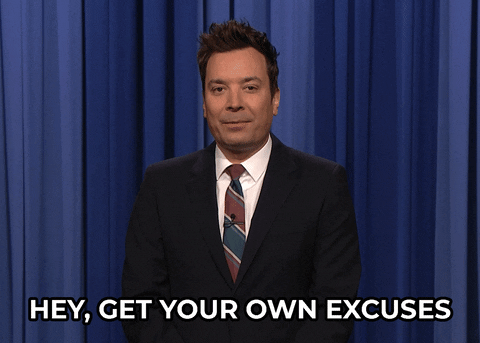
Good Day, and welcome to The Growth Compass!
⚠Reminder: We have given all subscribers access to our FREE Growth Compass Library that you can access HERE.

Here’s Where We Are Headed Today:
Benjamin Franklin on Excuses
How to Get Rid of Excuses
Favorite Posts I Found This Week
Free Mental Fitness Links 👇
Benjamin Franklin on Excuses
"He that is good for making excuses is seldom good for anything else.” - Benjamin Franklin

How to Get Rid of Excuses
Today, we are going to take a deep-dive into the topic of excuses from my Friday post on X. We will discuss why this topic so important, how to think about it, and how to finally stop making excuses.
What is an excuse? Excuses are just justifications we create to avoid responsibility or action. Making excuses is a way to avoid facing challenges, fear of failure, or discomfort. It allows us to remain in our comfort zone and shift blame externally while protecting ourselves from accountability and ownership. It’s a story we tell ourselves.
Why is it a problem? It’s the quickest way to lose trust in yourself or others. When you make excuses, you give away your power to change, act, or take control of a situation. It prevents you from taking responsibility, which stops you from making goals, instilling confidence, and becoming resilient.

What the science says:
Excuse-Making: Lisa A. Burke and Barbara Rau applied Schlenker’s Responsibility Triangle to examine chronic excuse-making behaviors among college faculty. The study found that faculty often make excuses, such as saying they had too many other obligations or unclear responsibilities, to avoid accountability for poor performance. While excuses can protect self-esteem in the short term, chronic excuse-making damages trust and negatively impacts collaboration, leading supervisors to view faculty as unreliable or incapable. The study suggests that tracking patterns of excuses and ensuring clear job responsibilities can help reduce this behavior and improve performance.
Taking Responsibility: In a study conducted at the University of Missouri, researchers tested Schlenker’s Responsibility Triangle, which outlines three common excuses people use to avoid responsibility: lack of control, unclear obligations, and shifting blame. They found that people who internalized their obligations—feeling personally responsible for their duties—were more likely to take accountability for their failures. In contrast, those who made excuses experienced less personal growth, less future commitment to tasks, and a decline in self-esteem over time. The study showed that individuals who avoided excuses were more likely to develop positive habits and higher expectations for future success.

Schlenker’s Responsibility
What can we learn from this?
Excuses damage self-esteem and trust: While making excuses can protect self-esteem temporarily, it ultimately erodes trust in both yourself and others. Chronic excuse-making leads to a lack of accountability, which undermines personal growth, relationships, and the ability to reach goals, leaving your self-esteem weaker in the long run.
Taking responsibility builds lasting self-esteem: Owning your mistakes and internalizing responsibility strengthens self-esteem over time. It allows you to take control of your actions, which fosters personal growth, increases resilience, and leads to higher self-confidence and success in future endeavors.
So what are the skills/habits that I need to think about?
Improve your Self-Awareness - It means understanding your thoughts, emotions, and behaviors in real-time. It matters because without recognizing when and why you make excuses, you can’t change those patterns. To build this habit, practice regular reflection—through journaling, mindfulness, or simply pausing to assess your responses to challenges—and notice when you’re avoiding responsibility.
Make Ownership a Habit - It means taking full responsibility for your actions and their outcomes, good or bad. This matters because it empowers you to take control of your life, leading to greater self-confidence and success. To make ownership a habit, start by focusing on what you can control and embracing mistakes instead of blaming others.
Challenge your thoughts and ask more questions of yourself - It means start to question whether your excuses are valid or simply a way to avoid discomfort. It matters because it helps you break free from limiting beliefs that hold you back. To build this habit, practice asking yourself tough questions like, “Is this a real obstacle, or am I just afraid of failing?” or “What can I do differently to overcome this?”
Set targets and hold yourself accountable - It means creating specific goals and checking your progress consistently. It matters because it keeps you focused, reduces procrastination, and helps you measure growth. To turn this into a habit, set small, achievable milestones with deadlines, and regularly review your progress. If needed, share your goals with an accountability partner for extra support.
Excuses are a part of life; the problem begins when they become a habitual response to challenges. When excuses are used regularly, they block personal growth, reduce accountability, and prevent you from reaching your full potential.
Favorite Posts I Found This Week
Free Mental Fitness Links 👇
That's a wrap for today. If you want to spread the joy, make sure to refer the newsletter to someone you think would benefit!
What'd you think of today's edition?
What I am reading and listening to:
Want More?
Feel free to view all of our FREE resources online here and our growing content library!
Interesting in advertising? Fill out this survey and we’ll get back to you soon!

